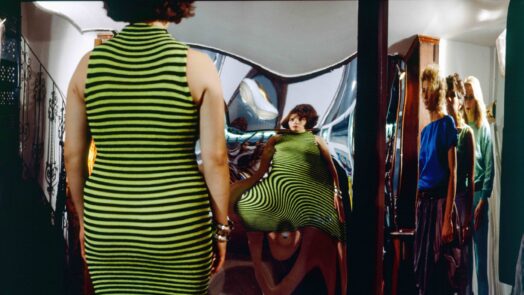| Film History | Austria – A Satire |
In 2004, the Diagonale festival trailer featured people laughing, brought together by artist and filmmaker Mara Mattuschka. What was happening? The industry representatives had joined forces for the “Gegendiagonale,” a counter event in defiance of the State Secretary for Art and Media at the time, Franz Morak, who had appointed his own team of directors. The gesture of Mattuschka’s cinematic intervention was as simple as it was unequivocal: laughing away the adverse circumstances and laughing in the face of the attempt at political appropriation.
Laughter as a reaction to the comic, absurd, and ridiculous should accompany this year’s historical special Österreich – Eine Satire. After all, comedy reverses hierarchies: it loves the anarchical power of everything physical and confronts even the most gruesome aspects of history with a mocking grin.
Austrian film has always had a special relationship to comic distortion: satire and the grotesque have always been favored means for correcting imbalances in the societal structures of their time. The period from the mid-1970s to the late 1980s seems to have been an especially productive period for socio-critical humor. During the Kreisky years and beyond, comedy with a subversive edge and even an enlightening agenda began to emerge. Contemporary protest movements, the struggle for women’s and minority rights, and the false promises of consumer society were addressed as were the adherence to historical cover-ups and half-truths. The variety of forms that arose at the time stretches across the genres—from feature and television films to essay and experimental films.
Mara Mattuschka is among the advocates of a humorous and absurd cinema that is rich in distortions and exaggerations with its humor anchored in the physical. In her short NabelFabel (1984), in the artist’s attempt to rebirth herself, her head and body become distorted—still using analogue means at the time. Conversely, the experimental feature film Der Einzug des Rokoko ins Inselreich der Huzzis, which Mattuschka made together with Andreas Karner and Hans Werner Poschauko in 1989, is a wild collage, a pastiche of ideas, styles, pomp, and camp.
Ursula Pürrer’s and Ashley Hans Scheirl’s films are characterized by queer physicality and a humor that plays with gleeful “proliferation” as well as shock moments and blatant disregard for traditional gender identities. VALIE EXPORT also explores the feminist-subversive potential of satire: Ein perfektes Paar oder die Unzucht wechselt ihre Haut (1986) is likewise a historically interesting documentary featuring several protagonists of the art scene at the time. Margareta Heinrich’s feature film Durch dick und dünn (1986) proves to be nothing short of visionary, offering a multi-leveled critique of outdated images of women and beauty ideals.

Durch dick und dünn by Margareta Heinrich © ORF
Nonetheless, satire and humor also have important historical-political functions. The frequently discussed television film Staatsoperette (1977) by director Franz Novotny and composer Otto M. Zykan caused a scandal even before its first broadcast on ORF and heralded a turning point in Austria’s official self-representation with regard to the Third Reich. Also exploring the media image of the country’s (historical) identity are Krieg in Wien (1989) by Michael Glawogger and Ulrich Seidl and Wienfilm 1896–1976 (1977) by Ernst Schmidt jr.
On the other hand, in Jetzt oder nie, Peter Patzak (director) and Helmut Zenker (screenplay) put humor at the service of the “ordinary people” who are usually overlooked by those in power. With a humanistic gesture, Patzak/Zenker give them the means to change the conditions of inequality: a gentle revolution, that expresses itself in new, altered forms of living together as a society.
(Dominik Kamalzadeh and Claudia Slanar)
The Diagonale would like to thank the ORF Archive and the Austrian Film Museum for their support.


